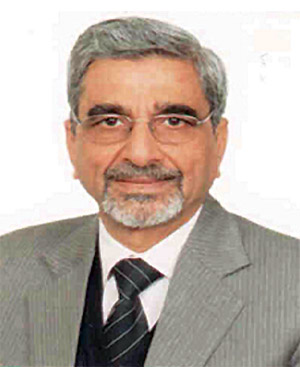- Prime Minister Narendra Modi inaugurates Aero India 2023 in Bengaluru; Releases Commemorative Stamp
- Defence Secretary meets delegations from Saudi Arabia, USA and Oman on the sidelines of Aero India 2023
- Foreign Ministers of 32 countries to attend Aero India 2023
- Embraer showcases the C-390 Millennium at Aero India 2023
'Big-ticket deals open up huge offset market'
N.K. Sharma, CEO, OIS Advanced Technology Pvt, Ltd
The acquisitions in the aerospace and defence sector which are happening at a rapid pace in India have opened the floodgates for foreign investments in India, thanks to the offset initiatives the Government of India has put forth. The offset procedures need due diligence and Offset India Solutions (OIS), which is an advisory and project management company, has been addressing precisely these requirements of foreign primes.

SP’s ShowNews (SP’s): With the opening up of the aerospace and defence sectors, modernisation of the armed forces, increased investments in homeland security, the offset opportunities must be humongous. Could you estimate what kind of offset opportunities exist in the country in the next couple of years?
N.K. Sharma (Sharma): No doubt the opportunities in offsets mandated through the various acquisition programmes of the Government of India (GoI) in the aerospace/ defence/homeland security sectors provide various avenues. This includes manufacturing of components/sub-assys locally (built to print/built to specifications). The foreign OEM primes can also employ sub-systems available locally and integrate them in their main equipment. Outsourcing by OEMs in the area of engineering and design activities has also taken off. Services is yet another major area where OEMs are banking on local support, for instance, framing and imparting training, assistance during trials of equipment, providing maintenance support etc. FDI in the key technologies is always a preferred area and foreign OEMs are slowly realising the potential of local skills in the area of designs, activities related to IT and abilities to provide value engineered products. Possibly in the near future, outsourcing in this segment may be on increase though gradually and cautiously. Thus the spectrum of activities under the offset regime is quite large.
SP’s: Have the offset opportunities gone unutilised in the past, if yes, why?
Sharma: Consolidated published data across the sector giving indication on the quantum of offset opportunities gone unutilised is possibly not available. It is, however observed that the implementation of offsets has not taken place in the manner as envisioned or estimated at the planning stage. You do notice contracts where though broad areas and gross values of offsets are identified, but when viewed with regards to data of actual finalised and assigned 'offset work packages' (detailed cost/delivery schedules), there are large gaps yet to be filled up. There is a view by some OEMs that Indian industry is not mature enough to qualify and take on large offsets. It has also been expressed that the earlier version of Defence Procurement Procedures (DPP) did not provide enough avenues and need certain amendments retrospectively to ease in the implementation of offsets. This is under the background that amendments in DPP introduced in year 2011 and 2012 have brought out measures which are considered to result in improved utilisation of contractual offsets, for instance, opening up of civil aerospace and homeland security segments to qualify, multipliers for SMEs, and in key technologies, increasing the time period for banking offset credits, etc.
SP’s: What are the main challenges that OEMs face when it comes to doing business in India and is compliance with offset norms difficult?
Sharma: Defence and aerospace industry in India is not as mature as this segment in some of the western countries. Systems and procedures are not fully formulated which is one of the essential requirement. SMEs in most of the countries as tier-II or tier-III suppliers are the recipient of major part of business. During the process of selection and assessment of vendors by OEMs, often there are observations that companies and SMEs, in particular, lack in maintenance of detailed documentation, requisite quality systems, mandatory certifications, general aesthetics and degree of confidence to deliver contracted items in promised time frames, as part of supply chain management. The industry as a whole is also not fully equipped to handle the large obligatory package of offsets, particularly when offset work packages include higher value items like sub-systems, integration activities. Absence of a single body to address all issues of OEMs, time bound responses to them are often cited as some of the suggestions. Notwithstanding that, recent amendments in DPP when put to practise will certainly pave way towards increased compliance.
SP’s: Do you think the offsets have augmented defence R&D and developed the civil aerospace and internal security?
Sharma: Strength in R&D is an important requirement for companies which are interested in the domain of defence and aerospace industry on long-term basis. Defence Procurement Procedures provide avenue for OEMs to make FDI in the area of R&D, be it technical know-how, ToT or joint development. But generally concrete and valued programmes under the R&D category have not taken off as foreign OEMs are reluctant to provide core knowledge for fear of creating future competitors. The present situation when there is a large unfulfilled obligations by OEMs as mandated, there are possibilities that the defence R&D base may get built up, may be in a gradual manner through higher stimulus packages by GoI. In order to get boost in R&D through offsets, the industry as a whole, both system integrators as well as SMEs, must have themselves fully prepared, through streamlining their internal procedures/systems and establishing essential infrastructure. Offsets in the civilian aerospace and homeland security has been opened up not long ago. At the same time, offshoots of technology from defence and aerospace will open up opportunities as several technologies are common in both the domains. Therefore one can expect growth in these areas probably at the similar pace.
SP’s: Is it true that the Indian industry is not capable of absorbing the heavy flow of offsets, as perceived by foreign vendors?
Sharma: Indian industry has always risen to the occasion and has demonstrated its capabilities at par with some of the best industrialised sector, for instance, automotive industry, information technology, etc. The defence offset business being relatively new, the industry is slowly gearing itself to meet the challenges. This sector is characteristic of being high in technology and quality and flow of business may not be steady, driven by market forces. One has to therefore permit time for industry to understand all fundamentals and nuances. I think some support from the government in creating the essential infrastructure will provide the necessary catalytic effect. The view of foreign OEMs as stated is based on their observations due to lack of structural approach in India and that the large base of smaller companies is not adequately organised.
SP’s: Could you tell us how Offset India Solutions/OIS Advanced Technology and group companies have helped in realising some of India's dreams of indigenisation, transfer of technology, etc?
Sharma: Offset India Solutions is an advisory and project management company and has been addressing the offset requirements of foreign prime OEMs. The execution part of offsets is looked after by OIS Advanced Technology (OIS-AT). OIS-AT, apart from this, is also involved in upfront development of selected high-technology products through its own funding. This is to meet the domestic requirements as well as supply of products to international markets both as exports as well as a means under the offsets programme. OIS-AT is gradually bringing up key technology products through indigenous development, and with its own IPR, provides advantages of local product support, supply of upgrades in future, keeping track of technological changes. With effective networking of foreign OEM primes and Indian companies under the offset business, there are bound to be upward trends in improved manufacturing and R&D leading to self-reliance.
SP’s: Do you think the offsets need to be further tweaked?
Sharma: Although the Government of India has introduced various amendments in policy and implementation part under the DPP to facilitate the development of business under aerospace/defence/homeland security, I feel, there is need to introduce a few more measures to kick-start towards improved implementation. For instance, easing the process of grant of industrial licence to SMEs, removing anomalies of taxes (excise, VAT, Custom duties etc. among all the stakeholders), providing institutional help to SMEs by creating and making available necessary infrastructure (specialised test labs, certifications, applications oriented institutes), providing soft loans to SMEs, creating offset fund for promoting R&D activities etc. This initial handholding will go a long way in giving a boost to indigenous industrial base in defence and aerospace sectors.





